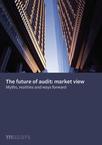
What will the audit of the future look like in Thailand?
In Thailand, the ongoing evolution of audit is marking a turning point in one of the oldest professions. Auditors, like companies, are facing new issues and challenges.
Below, Blake Dimsdale, Thailand Audit Leader and Wannawat Hemachayart, Thailand Audit Partner, react to the findings and share their insight.
What challenges do our auditors currently face in Thailand?
The disconnect between the real mission of the auditor and what stakeholders expect of them is a subject of intensifying debate for the profession. As a trusted third party and a close contact for management and corporate governance, the auditor’s main task has always been to provide assurance on the financials of the organisations that have appointed them. However, in APAC, there are higher expectations for auditors to detect fraud and fight corruption (43% compared to 28% in Europe). We need to resolve this expectation gap by having more open, transparent conversations about the objectives and responsibilities of auditors.
Auditing methods have developed significantly over the last decade. Despite the growing importance of APAC as a region pivotal to the world’s economy, the region is not entirely harmonised on international accounting and auditing standards. Audit is also valued more highly in some countries than others. Moreover, each local market brings with it specific challenges: infrastructure, data provisions, and business processes, to name a few. Most of all, how do countries ensure that regulation is balanced across all financial reporting players in the ecosystem, and not just a few?
Where is the innovation in audit in Thailand today?
The rise of cloud computing, big data and analytics enabled and intensified the success of collective intelligence, at a time when audit firms and multidisciplinary firms lacked the structural resources to gather it. This is consistent with our survey finding that 75% of PIEs show ‘strongly favourable’ attitudes towards new auditing technologies. In Thailand, over recent years Mazars has adopted our new bespoke international ATLAS audit software, which comes with built-in ATLAS data analytics capabilities. Soon, we will be able to offer direct audit portals for clients to make sharing and collaborating with clients easier throughout the audit process.
Big data solutions have allowed audit to edge towards a new era of deep and exhaustive data processing. This will benefit the quality of audits and therefore, the security of financial statements. In future, it may even be possible that artificial intelligence could play a role in audit methodologies and suggest patterns of fraud or error based on history. Audit could eventually become predictive, or even prescriptive.
While technology is vital to the audit process, the survey also revealed that the professionals behind the screens matter more. When it comes to choosing an audit firm, knowledge of the client’s business and an ability to understand the company environment come out top. This means that audit firms, although riding the technological wave, should not overlook that having the right human capital is a pre-requisite for success.
What will the audit of the future look like in Thailand?
Until ten years ago, auditors only dealt with samples of random events, which offered limited assurance. At first, the utilisation of standardised audit software for many firms allowed for an increase in quality and consitency. Further integration of data analytics solutions made it possible to instantly produce indicators and increase the volume of controlled data. These are both key steps towards digitalisation in the profession.
With that said, a key finding in our report reveals technology does not replace auditors. It actually empowers them by giving auditors more techniques to analyse and challenge the data (96% of respondents are in favour). In Thailand, as a country and as part of the APAC region that experiences dynamic growth, auditors must develop simultaneously with the business environment and continue to develop not only their auditing but also their business advisory skills.
How is the future of audit directly linked to our people?
It is anticipated that audit firms in Thailand will grow more interested in candidates with business expertise and a broader vision of the world around them. As well as technical knowledge, capability and comfort of using digital solutions will become increasingly important. When it comes to appointing an audit firm, members of audit committees have higher expectations. The report confirms that audit committees are more particular about technical expertise than CFOs, and CEOs are more concerned with an auditor’s knowledge of their business and sector.
That is why as audit becomes increasingly complex, firms are coming up with business models to build multidisciplinary audit teams where each member could be a specialist in their respective subject areas. It is exciting as we find ways to leverage on collaboration across borders and teams with the objective of optimising efficiency, effectiveness, and costs. The audit methodology, nonetheless, must remain consistent and bring these members together to achieve the same objective – audit quality.
How will human capital change the future of audit methodology?
In terms of methodology, the auditor of tomorrow will be required to act as a multidisciplinary architect to design a personalised audit approach for their client. They must also have the skill and talent necessary to mobilise other specialists for support when required.
Auditors have a crucial role to play in improving the relevance and quality of audit. In Thailand, as an emerging market, developing the next generation of auditors is key to shaping the right future for audit. They will need to evolve and adapt their skills in order to meet the expectations of increasingly sophisticated clients and financial markets. Part of an auditor’s evolution is to understand each company on its own – because not every business is the same, replicating an audit like “one size fits all” no longer works. Key to this advancement is the adoption of a business advisor mindset in auditors, transitioning from a purely bookkeeping or compliance outlook.
Conclusion
Opportunities for development arise where challenges are faced. To capitalise on these opportunities, audit must continue its transformation by exploring the three powerful levers at its disposal: technology, human capital, and collective intelligence. This mix is the real asset for both clients and the profession. This is especially true for Thailand as a fast developing economy, where rapid growth will create key differences that require a unique approach.
To find out more about the global results and read our global report go here.


